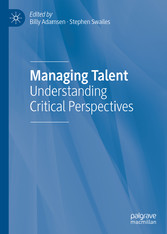Suchen und Finden
Service

Managing Talent - Understanding Critical Perspectives
Billy Adamsen, Stephen Swailes
Verlag Palgrave Macmillan, 2018
ISBN 9783319952017 , 236 Seiten
Format PDF, OL
Kopierschutz Wasserzeichen
Geräte
Acknowledgements
6
Contents
7
Notes on Contributors
9
List of Figures
12
List of Tables
13
Introduction
14
1: Talent Management: Gestation, Birth, and Innovation Diffusion
22
Historical Overview
23
Creation
27
A Meme’s Progress: The Diffusion of the Talent Meme
28
The Popularity of the Talent Meme
31
Conclusions
36
References
36
2: The Semantic Emptiness of Talent and the Accidental Ontology of Talent Management
42
The Actual and Possible World of Talent
44
The Emptiness of Talent and Its Accidental Ontology
45
The Actual Implications of Talent Management’s Accidental Ontology
47
The Practical Implications of using the Empty signifier ‘Talent’
49
Conclusion
52
References
53
3: Paralysing Rebellion: Figurations, Celebrity, and Power in Elite Talent Management
55
Power in Human Resource Development
56
Figurational Sociology: From Court to Contemporary Organizations
60
Figurations and Talent Management
64
Concluding Thoughts
68
References
69
4: The Meaning of Competence, Commitment, and Contribution in Talent Definition
72
Introduction
73
The Role of Talent Definition in Talent Management
75
Context Matters in Talent Definition
78
What Is Competence?
80
Transferable or Not: The Importance of Context
82
Potential: For What and Why Should Organizations Bother?
83
Learning Agility as a Component in Potential
86
Defining Talent
87
Conclusions
89
References
91
5: Subjective Bias in Talent Identification
94
Introduction
94
Talent
96
Talent Identification
97
The Challenges of Talent Identification in M&A
98
Talent Evaluation
99
Power, Politics, and Bias
101
HR Due Diligence as a Mechanism in the Identification Process
104
Re-engineer HR Due Diligence
105
HR Information Systems and the Role of Decision Support Systems
106
Conclusions and Recommendations
107
References
108
6: Talent Management in Egalitarian Cultures: Scandinavian Managers in Singapore
116
Introduction
116
Method
118
Research Settings
119
Theoretical Basis
120
Talent Selection
123
Talent Development
125
Empirical Analysis
128
Conclusions
133
References
136
7: Frontline Managers: A Re-examination of Their Role in Talent Management
141
Frontline Management and Talent Management
144
Research Methods
146
Identification of Themes
148
About the Study
149
Findings: Three Themes That Distinguish Frontline Managers
151
Frontline Managers Are Close to Employees: Both in Professional Terms and as Managers
151
Frontline Managers Between Two Knowledge Regimes
153
Establishment of Professional Communities?
154
Discussion
156
Conclusions
160
References
162
8: Talent on the Frontline: Role Stress and Customer Professionalism in the Banking Industry
167
Introduction
167
Theoretical Input
171
Empirical Basis
174
Findings
176
Performance-Oriented Talent
177
Analytical Talent
179
Interpersonal Talent
183
Intrapersonal Talent
187
Potential-Oriented Talent
190
Discussion
191
Conclusion
193
Appendix: Participating Interviewees
196
References
198
9: Why Do Organisations Run Talent Programmes? Insights from UK Organisations
205
Introduction
205
Talent Management
207
Defining Talent Management
207
Approaches to Talent Management
208
Theoretical Perspectives
209
Workforce Differentiation
209
Human Capital Theory
211
Institutional Theory
211
Research Methods
213
Case Study Settings and Their Talent Programmes
215
CareCo
215
ParcelCo
216
HotelCo
217
TechCo
217
Results and Discussion
218
Rationales for Talent Management
218
Developing Human Capital
220
Pressure from Institutional Environment
221
Underpinning Talent Management Philosophy in the Case Organisations
223
Conclusions
225
References
226
Correction to: Managing Talent
232
Index
233
Shop


